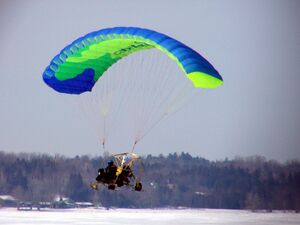Engineering:Summit 2
| Summit 2 | |
|---|---|

| |
| Role | Powered parachute |
| National origin | United States |
| Manufacturer | Aircraft Sales and Parts Summit Aerosports |
| Introduction | 1999 |
| Status | In production |
| Number built | 250 (February 2005)[1] |
The Summit 2, also called the Summit II, is an American powered parachute that was originally designed and manufactured in 1999 by Aircraft Sales and Parts of Vernon, British Columbia and now produced by Summit Aerosports of Yale, Michigan.[1][2][3][4]
Design and development
The aircraft was designed to comply with the US FAR 103 Ultralight Vehicles rules as a two-seat trainer, or as an amateur-built aircraft. It features a parachute-style high-wing, two-seats-in-tandem, tricycle landing gear and a single 64 hp (48 kW) Rotax 582 engine in pusher configuration. The 65 hp (48 kW) Hirth 2706, 50 hp (37 kW) Rotax 503, 80 hp (60 kW) Rotax 912 and the 60 hp (45 kW) HKS 700E engines are factory options.[1][2][4][5][6]
The aircraft is built from a combination of 6061-T6 aluminium, 4130 steel and stainless steel tubing. The canopy is attached to the carriage at four points, instead of the more conventional two points, to improve stability. In flight steering is accomplished via rail-mounted sliding foot pedals that actuate the canopy brakes, creating roll and yaw. Steering is via a 2:1 ratio system of pulleys that reduce the force required and increase control authority. The lack of pivoting control bars allows cockpit fairings to be fitted. On the ground the aircraft has lever-controlled nosewheel steering. The aircraft is factory supplied in the form of an assembly kit that requires 20–30 hours to complete.[1][2][4][6]
Specifications (Summit 2)
Data from Cliche and Summit[2][5]
General characteristics
- Crew: one
- Capacity: one passenger
- Length: 10 ft 4 in (3.15 m)
- Height: 6 ft 4 in (1.93 m) to top of propeller guard
- Wing area: 550 sq ft (51 m2)
- Empty weight: 310 lb (141 kg)
- Gross weight: 950 lb (431 kg) when fitted with a Mustang S-550 rectangular canopy
- Fuel capacity: 10 U.S. gallons (38 L; 8.3 imp gal)
- Powerplant: 1 × Rotax 582 twin cylinder, two-stroke, liquid-cooled aircraft engine, 64 hp (48 kW)
Performance
- Cruise speed: 26 mph (42 km/h, 23 kn) with a square canopy
- Maximum glide ratio: 4:1
- Rate of climb: 400 ft/min (2.0 m/s)
References
- ↑ 1.0 1.1 1.2 1.3 Downey, Julia: 2005 Trikes 'Chutes and Rotorcraft Directory, Kitplanes, Volume 22, Number 2, February 2005, page 52. Belvoir Publications. ISSN 0891-1851
- ↑ 2.0 2.1 2.2 2.3 Cliche, Andre: Ultralight Aircraft Shopper's Guide 8th Edition, page D-16. Cybair Limited Publishing, 2001. ISBN:0-9680628-1-4
- ↑ Summit Aerosports (2012). "Why a Summit Powered Parachute?". http://www.summitaerosports.com/why.htm. Retrieved 22 March 2012.
- ↑ 4.0 4.1 4.2 Bertrand, Noel; Rene Coulon; et al: World Directory of Leisure Aviation 2003-04, page 86. Pagefast Ltd, Lancaster OK, 2003. ISSN 1368-485X
- ↑ 5.0 5.1 Summit Aerosports (2012). "Summit 2 Specifications". http://www.summitaerosports.com/page-s2specs.html. Retrieved 22 March 2012.
- ↑ 6.0 6.1 Bernard, Mary and Suzanne B. Bopp: Summit Aerosports: Summit 2, Steel Breeze and Mini Breeze, Kitplanes, Volume 29, Number 12, December 2012, page 27-28. Belvoir Publications. ISSN 0891-1851
External links
 |

